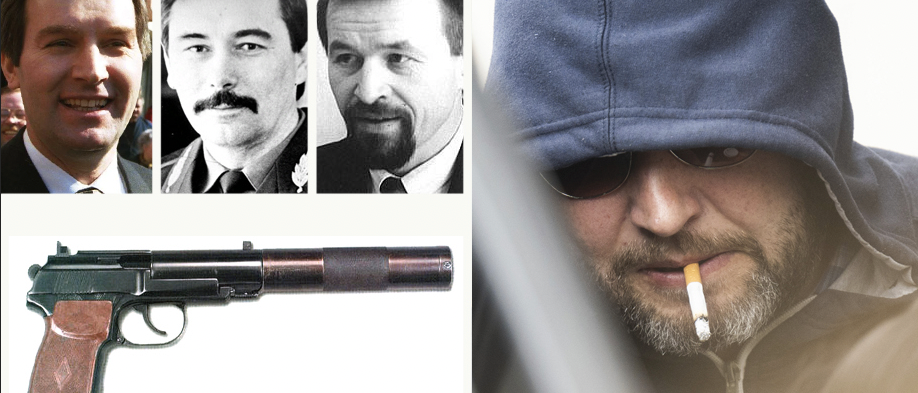Updated 22:40 | Published 22:27
Save the article
Aleksandr Lukashenko’s assassination squad killed three opposition figures in 1999.
A quarter of a century later, the Belarusian spetsnaz soldier Jurij Garauski was put on trial.
– We received an order and carried it out, said Garauski and was acquitted.
The 14 men were called the “Death Squad”.
Formally, the special force Sobr was supposed to take care of terrorists. In fact, they assassinated ordinary opposition politicians.
Appeared in TV interview
On May 7, 1999, the former Minister of the Interior of Belarus Yuriy Zacharanka disappeared.
Four months later, on September 16, the former chairman of the country’s National Election Commission Viktar Hanchar and businessman Anatol Krasouski disappeared.
All three belonged to the opposition in 1999 and were sought in vain by human rights organizations and relatives for 20 years.
Suddenly, in December 2019, the Deutsche Welle television channel published an interview with Jurij Garauski, a former Belarusian spetsnaz soldier – who detailed how the three men had been murdered.
The order: Seize and liquidate
On Friday, the now 45-year-old Garauski was acquitted of the murders in a Swiss trial.
As a 21-year-old Spetsnaz soldier, he shadowed Jurij Zacharanka for a week, he said in a 2019 Deutsche Welle television interview, before the order to “arrest and liquidate” Zacharanka came on the evening of May 7, 1999.
In the car on the way to the murder scene, the arrested person asked Zacharanka for only one thing:
– He just said “make sure it doesn’t hurt”.
Once at a military base, Zacharanka was laid on his stomach and Garauski’s boss, Dzmitri Paulitjenka, asked for a gun.
Garauski handed Paulitjenka a silenced PB pistol, and the boss shot Zacharanka twice in the heart.
The murder squad drove the body to the Northern Cemetery in the capital Minsk. A coffin was waiting in the crematorium and the men laid the murdered man in the coffin.
Crushed car with armored car
On September 16, 1999, it was time again.
After the two oppositionists Viktar Hanchar and Anatol Krasouski were arrested in the middle of the night, they were driven to the base of the murder command, where a five meter deep grave had already been dug.
Again, Garauski gave the murder weapon to his boss, who executed both men. They were then thrown into the grave.
Krasouski’s car was also buried:
– It was crushed by an armored car and buried, according to Garauski.
Three days later, the head of the murder squad came with money:
– He said “here, guys, you have Hanchar and Krasouski”. And then we got a thousand dollars each, Garauski said in the television interview.
Garauski, who fled Belarus in 2018 and sought asylum in Switzerland, also said he could pinpoint the locations where the three men had been buried, adding:
– I feel guilty. If the men had remained alive, the state of affairs would have been different in Belarus. As a participant in the murders, I offer my sincere condolences to their families and friends. I apologize, Garauski concluded the television interview in 2019.
“Made a killer out of me”
Based on Garauski’s own televised testimony, he was charged and put on trial in September 2023 in Switzerland.
During the trial, Garauski changed his testimony on some points.
Among other things, he claimed that he had not given the head of the murder squad the murder weapon and he claimed that he did not understand that the men were meant to be executed. Not “until Paulitjenka shot”.
– They made a murderer out of me in the TV interview. I have not murdered anyone, only participated in the arrests, Garauski claimed before the court and continued:
– I was a 20-year-old soldier, a little cog who carried out orders.
Garauski was fully acquitted in the trial. The judge explained that it was beyond doubt that the Belarusian state was to blame for what happened, but that Garauski’s role was unclear:
– It is possible that it was a colleague who described the events to him, explained judge Olaf Gubmel when the acquittal was announced on Thursday.
Disappointed daughter
The daughter of one of the murdered, Jelena Zacharanka, was disappointed:
– I am very upset. I think Garauski changed his testimony on purpose, she told the BBC, but added that the trial had at least shown how things are done in Belarus.
The head of the murder command, Dzmitrij Paulitjenka, has long since retired. However, during the protests against the results of the rigged presidential election in 2020, Paulitjenka was observed commanding a group of Omon soldiers in Belarus.
Sources: Deutsche Welle and BBC.
